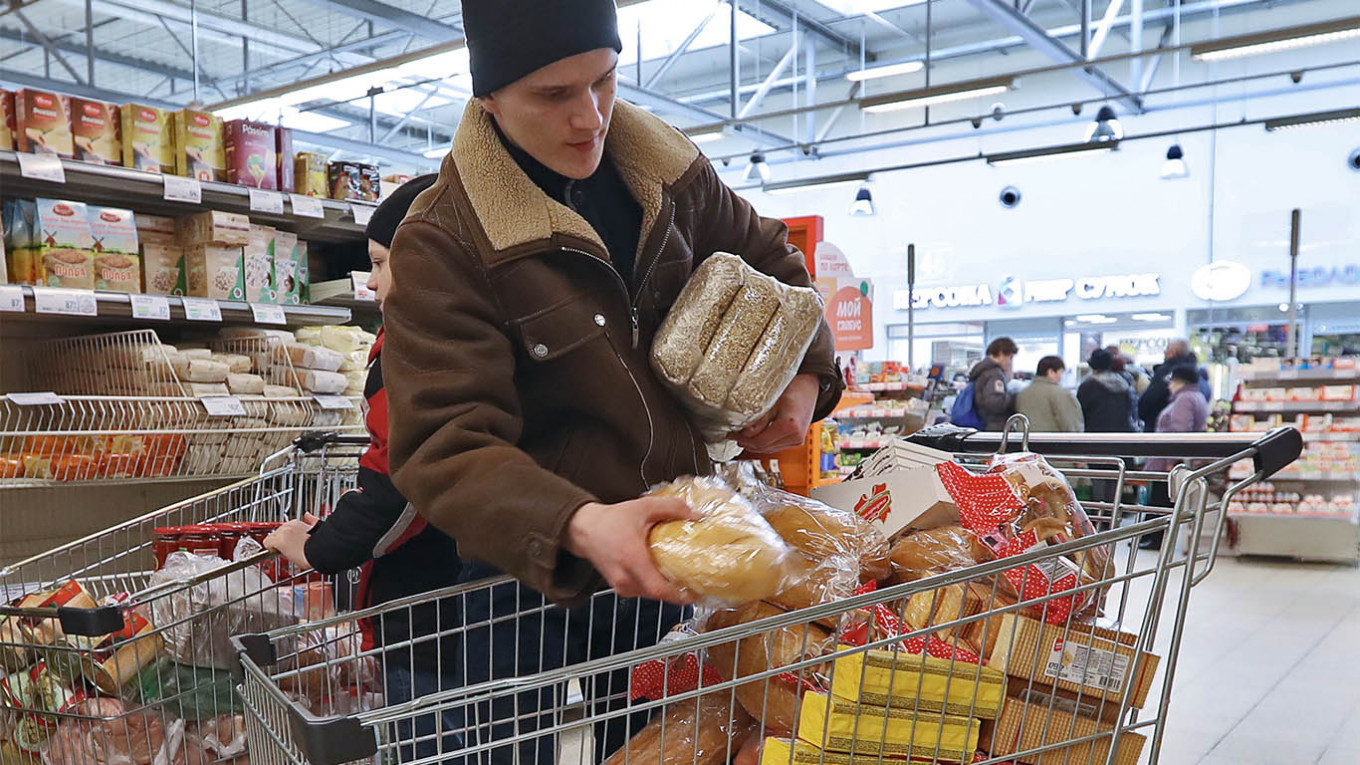On March 17, President Vladimir Putin addressed the nation for the first time about the coronavirus. In short, he said everything was under control. He added that, “like in a large, friendly family” the Russian people would overcome all difficulties with the aid of discipline.
His words had no effect on shoppers, who stripped Moscow supermarkets of supplies. Official data puts the number of infected people at over 100, while posts are multiplying on social networks that put the figure far higher and report that people with symptoms have been sent home to “drink tea” without ever having been tested for the virus.
Muscovites are growing increasingly frustrated over reports — such as one that appeared in Vedomosti newspaper — that officials will soon impose a curfew, close the metro and ban travel in and out of the city. Meanwhile, Russia’s provinces remain calm and unruffled, seemingly immune to social distancing and quarantine. But when grandparents in the countryside invite their grandkids in the capital to wait out the coronavirus with them, the young people refuse, preferring to “tough it out” with all the conveniences.
Although Putin stressed in his speech that there was no need to waste money stocking up on food, throngs of anxious Muscovites continued ravaging supermarkets, snatching up astronomical quantities of toilet paper and, inexplicably, buckwheat.
Buckwheat deserves separate mention here as a genuine symbol of the apocalypse — whether Russian or otherwise.
Buckwheat is peculiar to Eastern Europe. It is similar to South American quinoa, but lacks the great PR that has made that grain a favorite among vegans and fans of healthy living. Buckwheat, in contrast, is the staple of choice among Russian, Polish and Lithuanian retirees living on tiny pensions. They like that it’s cheap and can keep for years on the kitchen shelf, even if storing it for that long is inadvisable.
It is both sad and funny that Russia’s 20- and 30-somethings who like to buy a delicious cup of properly roasted coffee with plant-based milk every morning, and jet over to Austria to snowboard and Bali to surf, are now rushing off to stores to stock up on buckwheat.
What is going on? Is it mass stupidity or mass psychosis? Is it a delayed expression of genetic memory in the collective unconscious? Perhaps it is a little bit of everything.
Although it seemed to have disappeared in the distant past, it must have been lurking somewhere in the subconscious the whole time — like a phantom limb or a shared trauma that we cannot forget, such that the simplest jolt was enough to get everyone reaching for that old standby, buckwheat.
Clearing the store shelves of buckwheat does not signify panic. No, it is more a collective reflex, an expression of acting before thinking.
In fact, Russians — and especially those in the provinces — are filled with bravado. “What do we care about the virus?” they seem to say. “We’ve seen much worse.” Then they add: “We couldn’t be bothered by it.”
It might seem at first glance that such a dismissive attitude bears no connection to panicked Muscovites lugging sacks of buckwheat home. But look a little deeper and you’ll find the underlying logic.
At the biological level, Russians act instinctively, and when the call of their ancestors is triggered, they instantaneously drop their lattes with almond milk and run for the buckwheat without even knowing why. Their inner program is telling them: “Hoard, hole up, wait it out.”
But on the existential level, Russians like to say: “The barn has burned down, so let the house burn, too,” or “We’ve never lived well so there’s no use in starting now.”
Few people say it openly, but many Russians, and especially those with nothing to lose — meaning most of them — inwardly rejoice at the all-purifying flames of an apocalypse that reduces everything to its prior state. Interestingly, Russia’s entire national philosophy is deeply eschatological — that is, focused on the end of the world. In this sense, “zeroing out” Putin’s presidential terms dovetails perfectly with “zeroing out” the world’s fortunes.
Simply put, Russians have never been as enthralled by the well-fed, happy life as they are by the flames of Armageddon. The end of the world is a show that is always worth watching. And when you want a break, just run to the store for the last two bags of buckwheat.
A Message from The Moscow Times:
Dear readers,
We are facing unprecedented challenges. Russia's Prosecutor General's Office has designated The Moscow Times as an "undesirable" organization, criminalizing our work and putting our staff at risk of prosecution. This follows our earlier unjust labeling as a "foreign agent."
These actions are direct attempts to silence independent journalism in Russia. The authorities claim our work "discredits the decisions of the Russian leadership." We see things differently: we strive to provide accurate, unbiased reporting on Russia.
We, the journalists of The Moscow Times, refuse to be silenced. But to continue our work, we need your help.
Your support, no matter how small, makes a world of difference. If you can, please support us monthly starting from just $2. It's quick to set up, and every contribution makes a significant impact.
By supporting The Moscow Times, you're defending open, independent journalism in the face of repression. Thank you for standing with us.
Remind me later.








